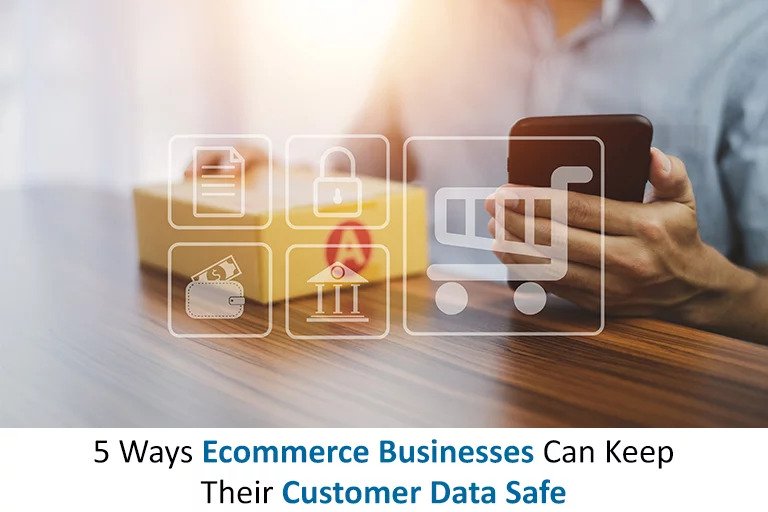Data security is a required component of all ecommerce businesses. Online channels can help you sell more items to customers, but you must have strong data security standards to gain their confidence. With such trust, scaling your organization and competing in current marketplaces would be much easier.
What is the meaning of Data Security in Ecommerce Businesses?
Data security prevents unwanted access, corruption, or theft of digital information across its entire lifespan. It refers to safeguarding your data from illegal access or usage, which might result in data disclosure, loss, or corruption. Encrypting your data in Ecommerce Businesses prevents hackers from utilizing it if it is compromised is an example of data security. Data is a precious asset that businesses create, acquire, store, and exchange. The main goal of Data security is that keeps customer data Safe.
Protecting it from internal or external corruption and illegal access protects a company from financial loss, reputational harm, consumer confidence degradation, and brand erosion. The primary security goal in Ecommerce Businesses is to safeguard people and their possessions. Customer Data Safe encompasses their physical safety as well as their belongings. Criminals will find it challenging to target a person or a location if security measures are in place.
Why is it essential to Can Keep Customer Data Safe?
Below are the following reasons to show why it is essential to keep Customer Data Safe for Ecommerce Businesses:
- Securing customer loyalty requires the protection of personal data
There are several advantages to protecting your customers’ information. You will comply with regulatory rules and acquire your customers’ trust. Customer trust goes a long way toward safeguarding any organization’s future via customer retention.
- Data breaches can occur in any organisation
Many small and even some large firms are unaware of the ramifications of data breaches. Worse, they believe they are untouchable and immune to threats from hackers and cybercriminals. According to research, small ecommerce businesses are the most vulnerable to cyberattacks, with around 67% experiencing a hack and 58% experiencing a breach.
- Increase your company’s brand value and safeguard its image
Data breaches are directly related to a company’s brand value and reputation loss. Brands that passionately believe in protecting their customers’ data and plainly express their strong data privacy principles to their consumers frequently rank high in terms of brand value. Naturally, bold statements support actions that necessitate a solid commitment to preventing data loss and theft and keeping Customer Data Safe.
- You safeguard your company’s reputation
Customers trust you when they provide you access to their data and other sensitive information, such as credit card information. When your company suffers cyber-attack after cyber assault because you fail to keep customer data safe, it gives your company a negative reputation.
- A solid privacy policy might provide you with a competitive advantage
Every individual has an “online presence,” whether purposeful or accidental, in today’s digitally linked society. Maintaining robust data security procedures and proving your capacity by keeping customer data safe allows you to keep customers effectively.
5 Ways to keep Customer Data Safe
The following are the top 5 ways to keep Customer Data Safe.
- Only collect information that you intend to use
Don’t just collect data because you can. If you lose it, it may become a burden. CTAs are used on almost every landing page in ecommerce businesses. It is simple to obtain a customer’s email address, phone number, or credit card information. But, before you acquire and store this sensitive information, consider if you truly need it in the first place. There is no need for an online business to receive every available data from a consumer.
- Maintain an inventory of service components and test them on a regularly
Understanding the surroundings and preparing are essential aspects of a good defense. When running an internet-facing application, businesses must keep an inventory of all service components and their dependencies, do active and passive scanning, have third parties conduct penetration testing, and conduct red team/blue team exercises.
- Recognize GDPR and CCPA
Recognize GDPR and CCPA standards as one of the first steps in protecting the data of your ecommerce consumers. These two standards specify how corporations and organizations should manage user data and the procedures they must take to protect it. Consequently, depending on your organization’s location, you may need to refer to GDPR or CCPA. Following the reference rule will surely safeguard your firm from infractions, which may result in severe financial fines and legal ramifications.
And a negative impact on your organization’s reputation.
- Encrypt
Always remember to encrypt essential information such as passwords as a safeguard in case the data becomes compromised. Cyber security experts advise company owners who hold client information on their PCs to encrypt their hard discs with software. As a result, if their computer is lost or stolen, their clients’ information will not be compromised.
- Examine your security procedures
No matter how robust your security is, it would help if you examined your processes regularly. Is your team installing updates on schedule, and are your systems adequately configured? Security or system upgrades frequently disrupt earlier setups, providing hostile actors an entry point into your systems. It is also common to practice auditing user access to customer data. When an employee leaves your firm, check and deactivate access.
User IDs belonging to departing workers, often known as phantom users, provide hackers with an easy entry point into your systems.

